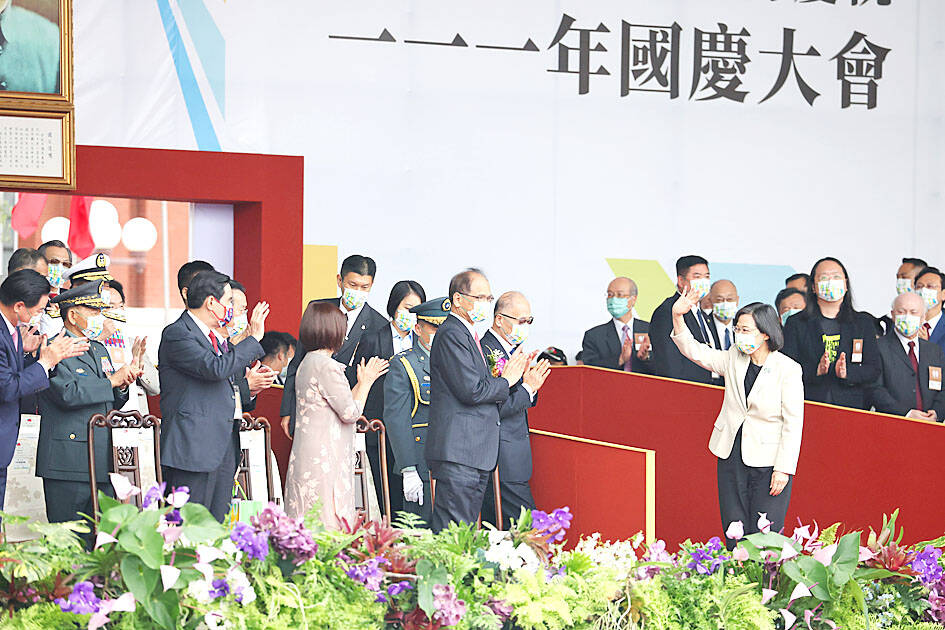President Tsai Ing-wen’s (蔡英文) remark that her administration is willing to work with Beijing to find a “mutually agreeable arrangement” to uphold peace and stability in the Taiwan Strait signals goodwill toward China, analysts said yesterday.
Tsai made the remark during her Double Ten National Day address on Monday.
Unlike last year’s address, in which Tsai said the Republic of China and the People’s Republic of China “should not be subordinate to each other,” her remarks this year seem to offer an olive branch to improve cross-strait stability, said Chu Chao-hsiang (曲兆祥), a professor at National Taiwan Normal University’s Graduate Institute of Political Science.

Photo: CNA
Beijing’s “one China” principle views Taiwan as part of its territory.
Cross-strait ties involve not only Taiwan and China, but also international factors, in particular the ties between Washington and Beijing, Chu said.
However, as Tsai’s address is expected to draw less ire from China, it can be considered, to some extent, to be an expression of goodwill, he added.
Chu praised Tsai, who is also chairperson of the Democratic Progressive Party (DPP), for her emphasis on Taiwan’s plan to reopen its borders to foreign arrivals.
Tsai said in her address that cross-strait armed confrontation is “absolutely not an option,” adding: “We look forward to the gradual resumption of healthy and orderly cross-strait people-to-people exchanges after the loosening of border restrictions on both sides, thereby easing tensions in the Taiwan Strait.”
“Provided there is rationality, equality and mutual respect, we are willing to work with the Beijing authorities to find a mutually agreeable arrangement to uphold peace and stability in the Taiwan Strait,” she said.
Chu said Tsai came up with concrete measures to boost cross-strait interactions following reopening, adding that they are expected to help Beijing and Taipei reduce tensions.
Tensions rose particularly following US House of Representatives Speaker Nancy Pelosi’s 19-hour visit to Taipei in early August, which prompted China to increase military exercises around Taiwan. Since then, Chinese military planes have repeatedly crossed the median line of the Taiwan Strait.
Chang Wu-ueh (張五岳), an associate professor at Tamkang University’s Graduate Institute of China Studies, said although he is not naive enough to think Tsai’s speech would lead to a significant improvement in cross-strait ties or mutual trust between Taipei and Beijing any time soon, the president’s tone was unlikely to spark anger from China or worsen ties even further.
Chang also said using the border reopening to reinforce cross-strait exchanges could calm tensions between Taipei and Beijing.
However, Shi Yinhong (時殷弘), a professor of international studies at Renmin University in Beijing, said Tsai’s mention of “Taiwan’s sovereignty” in her address amounts to “Taiwan independence,” to which China strongly opposes.
Shi said he does not think Tsai adopted a softer approach in her address, adding that the “1992 consensus” is the only foundation for cross-strait ties.
The so-called “1992 consensus” — a term that former Mainland Affairs Council chairman Su Chi (蘇起) in 2006 admitted making up in 2000 — refers to a tacit understanding between the Chinese Nationalist Party (KMT) and the Chinese Communist Party that both sides of the Taiwan Strait acknowledge that there is “one China,” with each side having its own interpretation of what “China” means.

Taiwanese can file complaints with the Tourism Administration to report travel agencies if their activities caused termination of a person’s citizenship, Mainland Affairs Council Minister Chiu Chui-cheng (邱垂正) said yesterday, after a podcaster highlighted a case in which a person’s citizenship was canceled for receiving a single-use Chinese passport to enter Russia. The council is aware of incidents in which people who signed up through Chinese travel agencies for tours of Russia were told they could obtain Russian visas and fast-track border clearance, Chiu told reporters on the sidelines of an event in Taipei. However, the travel agencies actually applied

Japanese footwear brand Onitsuka Tiger today issued a public apology and said it has suspended an employee amid allegations that the staff member discriminated against a Vietnamese customer at its Taipei 101 store. Posting on the social media platform Threads yesterday, a user said that an employee at the store said that “those shoes are very expensive” when her friend, who is a migrant worker from Vietnam, asked for assistance. The employee then ignored her until she asked again, to which she replied: "We don't have a size 37." The post had amassed nearly 26,000 likes and 916 comments as of this

New measures aimed at making Taiwan more attractive to foreign professionals came into effect this month, the National Development Council said yesterday. Among the changes, international students at Taiwanese universities would be able to work in Taiwan without a work permit in the two years after they graduate, explainer materials provided by the council said. In addition, foreign nationals who graduated from one of the world’s top 200 universities within the past five years can also apply for a two-year open work permit. Previously, those graduates would have needed to apply for a work permit using point-based criteria or have a Taiwanese company

The Shilin District Prosecutors’ Office yesterday indicted two Taiwanese and issued a wanted notice for Pete Liu (劉作虎), founder of Shenzhen-based smartphone manufacturer OnePlus Technology Co (萬普拉斯科技), for allegedly contravening the Act Governing Relations Between the People of the Taiwan Area and the Mainland Area (臺灣地區與大陸地區人民關係條例) by poaching 70 engineers in Taiwan. Liu allegedly traveled to Taiwan at the end of 2014 and met with a Taiwanese man surnamed Lin (林) to discuss establishing a mobile software research and development (R&D) team in Taiwan, prosecutors said. Without approval from the government, Lin, following Liu’s instructions, recruited more than 70 software